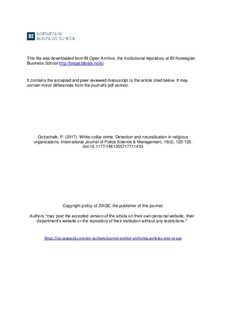White-collar crime: Detection and neutralization in religious organizations
Journal article, Peer reviewed
Accepted version
Permanent lenke
http://hdl.handle.net/11250/2472419Utgivelsesdato
2017Metadata
Vis full innførselSamlinger
- Publikasjoner fra CRIStin - BI [1015]
- Scientific articles [2181]
Originalversjon
International Journal of Police Science and Management. 2017, 19 (2), 120-126. 10.1177/1461355717711453Sammendrag
Policing religious organizations presents challenging situations. When there is suspicion of financial crime by white-collar criminals, secrecy and trust represent obstacles to law enforcement. This article discusses the lack of detection and neutralization techniques often applied in religious organizations. There may be too much trust, too much freedom, too much individual authority, too little scepticism, too much loyalty and too little control of the financial side in religious organizations. There may be no empirical evidence for the proposition that religion has a deterrent effect on crime, although sociologists and criminologists have long recognized potential links between religious belief and delinquent behaviour.
